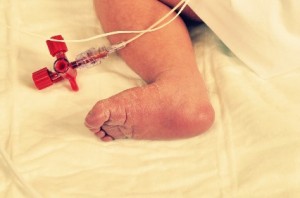Neonatal Abstinence Syndrome or NAS is defined as a condition in which a baby presents symptoms of withdrawal after exposure to opiate drugs while in utero. NAS is occurring at increasing rates across the nation, leaving states grappling with treating drug-dependent newborns and whether to charge, prosecute and incarcerate pregnant women who test positive for illegal drug use.
Although awareness of NAS has increased over the last several years, state lawmakers and prosecutors have struggled for decades with how to address drug use among pregnant women. This year, Tennessee became the first state to statutorily criminalize drug use during pregnancy by permitting prosecutors to file assault charges against pregnant women who use certain controlled substances. Alabama and South Carolina are currently the only two states where courts have held that laws meant to protect children from exposure to drugs apply to unborn fetuses. County prosecutors in Calhoun County, Alabama recently announced they will soon begin charging pregnant women who test positive for drugs.
Many groups have come out against the types of prosecutions planned in Calhoun County, including the American Medical Association, American College of Obstetrics and Gynecologists and the American Academy of Pediatrics. Other states and localities seem to agree and are exploring a non-punitive approach to the problem. In 2012, the Florida Legislature adopted a law that created a statewide task force to examine the extent of prescription drug abuse among expectant mothers. Task force priorities for the upcoming year, as outlined in the 2014 progress report, are wide-ranging. They include (1) development and implementation of a public awareness initiative aimed at educating the public about the dangers of drug abuse during pregnancy, (2) making voluntary drug screening of patients a best practice for obstetricians, (3) creating an immunity provision in Florida law for pregnant women seeking prenatal care or substance abuse treatment and (4) finding ways to increase voluntary use of the state’s prescription monitoring program.
Unlike Florida and as referenced above, Tennessee law does now and will, until at least 2016, permit prosecution of pregnant women who use drugs illegally during their pregnancy. However, the state employs a multi-disciplinary approach to addressing NAS. The Tennessee Neonatal Abstinence Syndrome Subcabinet Working Group, formed in 2012 and comprised of cabinet-level representatives, reaches out to prescribers and dispensers, hospitals, social service agencies and treatment providers to help (1) develop prevention strategies aimed at reducing the number of women taking narcotics and becoming pregnant while taking narcotics and (2) assure that pregnant women using narcotics receive healthcare that will minimize the likelihood of NAS. Active enrollment in an addiction recovery program during pregnancy and successful completion of such a program after delivery is an affirmative defense to prosecution under Tennessee’s new law.
As this nation continues to battle a prescription drug abuse epidemic, reports of Neonatal Abstinence Syndrome are on the rise and states have a variety of options available to them in their efforts to address this public health crisis. A comprehensive approach should focus not on charging, prosecuting and incarcerating pregnant women, but rather on educating them about the effects drug use can have on their unborn children and on providing treatment which can ultimately protect the health and safety of mother and child.
 Sarah Kelsey, Chief Executive Officer for the National Alliance for Model State Drug Laws
Sarah Kelsey, Chief Executive Officer for the National Alliance for Model State Drug Laws
Published
October 2014
 Get Support
Get Support

